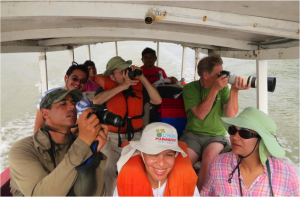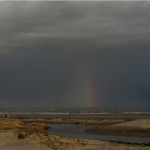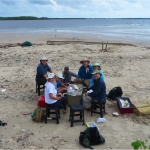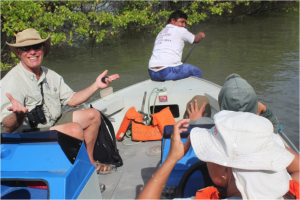Update from Brazil #3: Kindness and Grim Deprivation
CWF’s Larry Niles and his colleagues are on a two-week trip to northern Brazil to trap and band Red Knots, Ruddy Turnstones, and other shorebirds on their wintering grounds. We’ll be posting summaries of his blog entries as he reports from the field.

After several days of trapping efforts on the mainland, we took the hour-long boat trip to Curupu, an island just off the coast of Panaquatira. Our trapping work here last year went off almost without a hitch, and we were off the island in less than 24 hours. So when we arrived this year, we naively expected this year’s expedition to go just as easily.
It didn’t. Instead, we suffered three days and two nights of oven-like tropical heat while being blasted by fine wind-driven sand and fighting the tides to catch birds. We slept with the tents sealed to protect us from the blowing sand, but this left us wet with sweat every morning. Mosquitoes met us in droves as we emerged from our tents before dawn light to set the cannon net. Sudden downpours chilled us to the bone, while the blazing sun that followed fried us.

On the morning of our last day, the team endured several of these drenching rainstorms while resetting the net twice, following the retreating tide line. But our perseverance finally paid off. After three days of frustration, we were finally able to make a small catch. The eight red knots (compared to a catch of 115 last year) were fitted with new geolocators and set free to join the rest of the flock. After our short-lived deprivations, we hoped to be free of Curupu.
Not quite. We had hoped that we could leave by midday, but transporting our equipment to the boat landing was delayed by yet another downpour. When we finally made it to the landing, we found that we couldn’t leave until an incoming tide. We were facing the possibility of another night on the island.

Expecting only tribulation, we were suddenly met with kindness. Indio Sousa, the father of a Brazilian student who joined us for our misadventure, and who manages a compound of houses on the island, invited us to stay in the guest quarters. While we luxuriated in what felt like our first shower in months, he served us platters of watermelon and pineapple and cooked a plate of shrimp, then fish. As we enjoyed his generosity, we relaxed in the languid late afternoon tropical heat, cooled by gentle breezes, while being serenaded by the melodious song of native forest birds and amphibians.
The overnight provided us with more than cool air. It also provided a last chance to trap, this time for willets. We had brought 30 geolocators to attach to these poorly understood temperate breeders, one of only three shorebirds that breed in New Jersey, and an emblematic species of the breeders of Delaware Bay.

Unfortunately, it was not to be. The operation needed precise timing, an unlikely event in our short-lived experience in northern Brazil, especially given our bad fortune. The captain of the small boat that brought us to this island came late, then ran out of gas while taking us to the catch site. Finally arriving at the roost that we scouted at the start of the trip, we faced an already declining tide. We tried to catch, but the island defeated us one final time.
But back on the mainland, we were once again blessed with kindness. As we fled to our home base, the parents of another Brazilian student on our team graciously offered a home-cooked meal, a very generous offer considering the size of our group and their own modest means. We left their home with full stomachs, warmed hearts, and mixed feelings about the wild coast of Brazil.
For the original blog entries, see Larry’s posts Curupu: Kindness and Grim Deprivation and Maranhão Lost and Found.
Discover more from Conserve Wildlife Foundation of NJ
Subscribe to get the latest posts sent to your email.